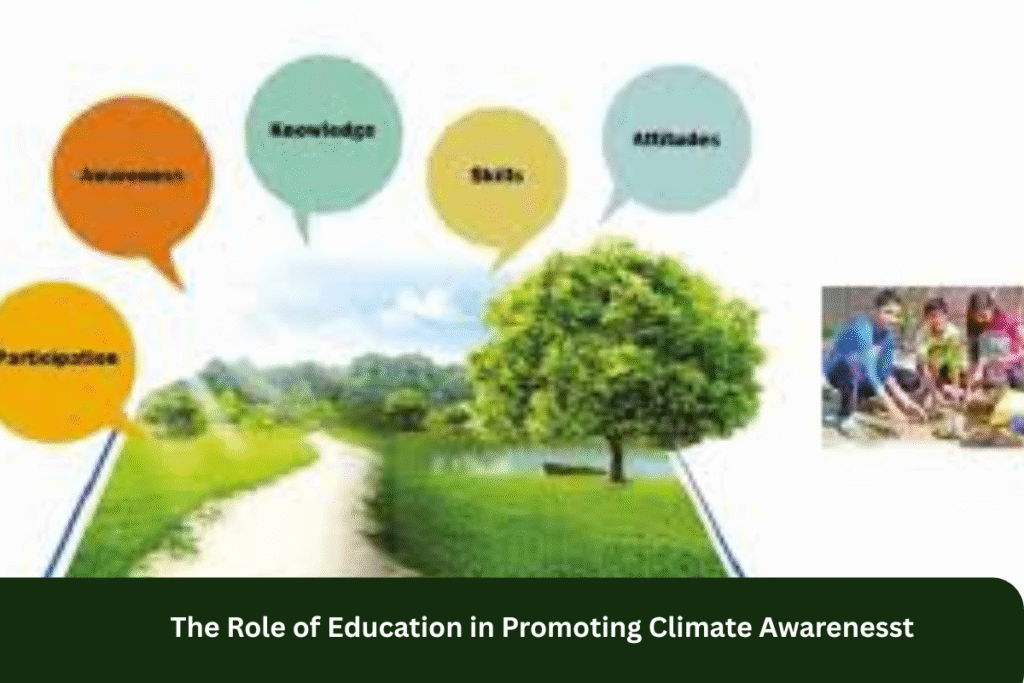
In the face of the global climate crisis, education has emerged as a powerful tool for promoting climate awareness, fostering sustainable behaviors, and driving collective action. Climate change is one of the most pressing challenges of our time, and addressing it requires not only technological innovations and policy changes but also a shift in public understanding and behavior. Education plays a crucial role in informing individuals, communities, and societies about the causes, impacts, and solutions to climate change. In this article, we explore the role of education in promoting climate awareness, its importance in shaping future leaders, and how it can empower individuals to take meaningful action for the planet.
1. Why is Education Important for Climate Awareness?
Education is a fundamental driver of change in society. By increasing knowledge about climate change, its impacts, and the urgent need for action, education can inspire individuals to adopt sustainable practices, advocate for climate-friendly policies, and engage in climate activism. The role of education in climate awareness is multifaceted:
- Informed Decision-Making: Climate education helps individuals make informed choices about energy use, waste reduction, sustainable consumption, and transportation.
- Empowerment: By understanding the science behind climate change, individuals are empowered to take action in their daily lives, whether through reducing their carbon footprint or supporting green initiatives.
- Community Engagement: Educating communities about climate change fosters collective action, leading to local climate solutions and greater involvement in climate policy discussions.
- Long-Term Impact: The next generation of leaders, policymakers, and innovators will be better equipped to address climate challenges with a strong foundation in climate science and sustainability.
2. Key Areas Where Education Promotes Climate Awareness
Education about climate change is essential in a variety of contexts, from schools and universities to community centers and media. Here are some key areas where education plays a significant role in promoting climate awareness:
a. Formal Education: Schools and Universities
Schools and universities are at the forefront of educating future generations about climate change and sustainability. By integrating climate change topics into curricula, educators can help students understand the science of climate change, the social and economic impacts, and the solutions available.
- Curriculum Integration: Including climate change in subjects such as science, geography, economics, and social studies ensures that students understand the complexity of the issue and its relevance to their lives.
- Sustainability Initiatives: Many educational institutions are adopting sustainable practices, such as renewable energy, waste reduction, and green building certifications. These actions not only reduce their environmental impact but also serve as real-world examples of sustainability in action.
- Climate Activism and Student Engagement: Schools and universities often serve as hubs for climate activism. Student organizations, climate clubs, and educational campaigns raise awareness and promote environmental advocacy.
b. Non-Formal Education: Community Outreach and Public Awareness
While formal education plays a significant role, non-formal education is equally important in promoting climate awareness. Community outreach programs, public campaigns, and media initiatives help reach diverse audiences, including those who may not have access to formal education systems.
- Public Awareness Campaigns: Governments, NGOs, and environmental organizations run educational campaigns to raise awareness about climate change. These campaigns often focus on actionable steps individuals can take, such as reducing waste, conserving energy, or supporting climate-friendly policies.
- Workshops and Seminars: Community-based workshops and seminars can provide in-depth discussions on topics like renewable energy, sustainable agriculture, and climate justice. These programs are particularly valuable in rural or underserved communities.
- Media and Digital Platforms: Social media, documentaries, podcasts, and websites are powerful tools for spreading climate information. They can engage a global audience, educate people about climate change, and provide updates on the latest scientific research and policy developments.
c. Climate Change Education for Policymakers and Professionals
To tackle climate change effectively, policymakers, industry leaders, and professionals must understand the scientific, economic, and social aspects of the crisis. Providing education to these groups is critical for driving climate action at the governmental and corporate levels.
- Climate Policy Education: Policymakers need a strong understanding of the science and impacts of climate change to make informed decisions on climate action, carbon pricing, renewable energy policies, and climate adaptation strategies.
- Industry Training: Professionals across sectors—from energy and agriculture to finance and technology—need training on sustainable practices and the environmental impacts of their work. This helps ensure that businesses and industries adopt climate-friendly practices and contribute to reducing carbon emissions.
3. How Education Can Drive Climate Action
Education doesn’t just raise awareness about climate change; it also equips people with the knowledge and skills needed to take meaningful action. Here’s how education can drive climate action:
a. Promoting Sustainable Lifestyles
Education helps individuals understand how their personal choices contribute to climate change and what they can do to mitigate their impact. For example:
- Energy Efficiency: Understanding how to use energy-efficient appliances, reduce heating and cooling consumption, and shift to renewable energy sources.
- Sustainable Consumption: Encouraging the reduction of waste, recycling, and supporting sustainable brands and products.
- Transportation Choices: Educating people on the benefits of walking, cycling, using public transit, or driving electric vehicles to reduce their carbon footprint.
b. Advocacy and Policy Engagement
Informed individuals are more likely to become active participants in climate policy discussions. Education encourages people to:
- Advocate for Climate-Friendly Policies: By understanding the political landscape, individuals can lobby for policies that promote clean energy, carbon pricing, and sustainable development.
- Support Climate Legislation: Educated citizens are more likely to support climate legislation and initiatives, such as the Paris Agreement, that aim to reduce global emissions and promote climate resilience.
c. Encouraging Innovation and Green Solutions
Education also fosters innovation. By equipping the next generation of scientists, engineers, and entrepreneurs with climate knowledge, we inspire the creation of new technologies and solutions to tackle climate change.
- Renewable Energy Technologies: Education in engineering and technology can drive innovation in solar, wind, and energy storage solutions.
- Sustainable Business Models: Entrepreneurs and business leaders educated in sustainable practices can create companies that prioritize environmental responsibility, reducing waste, energy use, and emissions.
4. FAQs
1. What is the role of education in addressing climate change?
2. How can schools and universities help promote climate awareness?
Education plays a critical role in raising awareness about climate change, empowering individuals to take action, and equipping future generations with the knowledge and skills needed to solve climate challenges. It helps people understand the causes, impacts, and solutions to climate change.
3. Why is climate change education important for policymakers?
4. How can individuals take action based on climate change education?
5. What are some examples of non-formal climate change education?
5. Conclusion
Education is a powerful tool in the fight against climate change. By raising awareness, promoting sustainable practices, and inspiring action, education can play a pivotal role in addressing the climate crisis. As we continue to face the challenges of climate change, it is essential to ensure that individuals, communities, and policymakers are equipped with the knowledge and tools needed to create a sustainable, resilient future. Through education, we can empower people to take meaningful steps toward mitigating climate change and ensuring a better planet for future generations.
